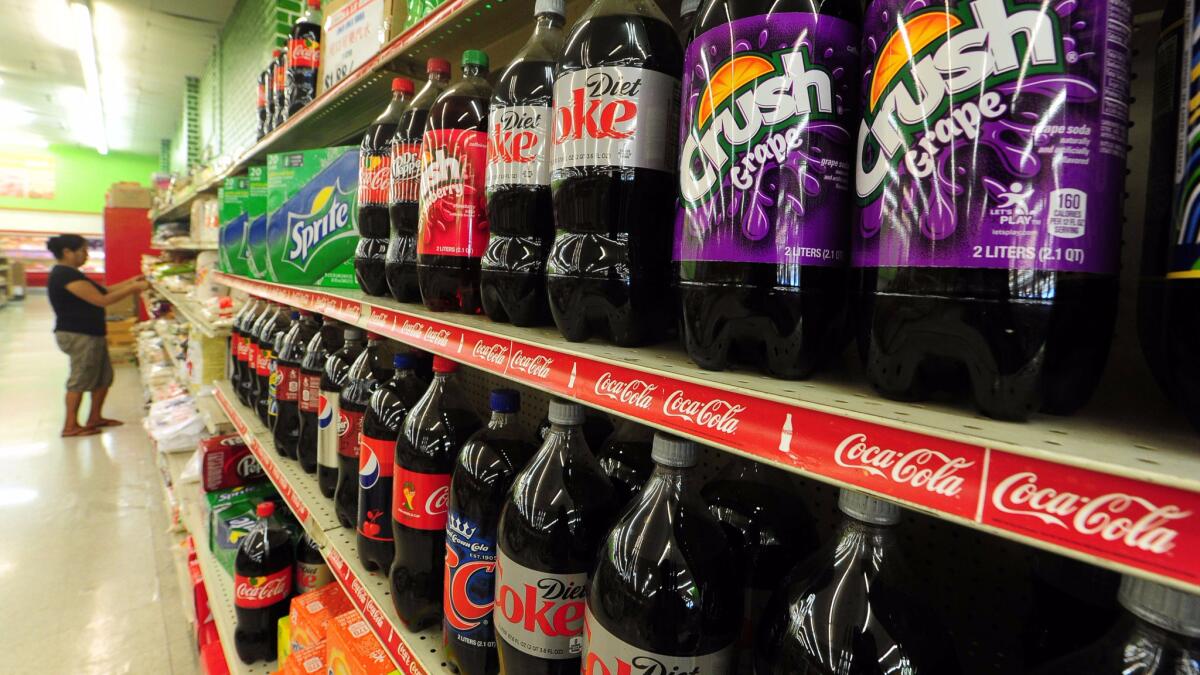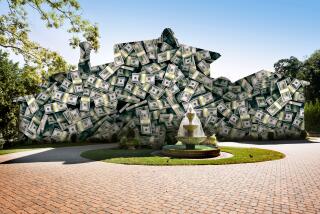Berkeley sees a big drop in soda consumption after penny-per-ounce ‘soda tax’

- Share via
Can Americans tax themselves out of their obesity crisis? A new analysis of Berkeley’s first-in-the-nation “soda tax” offers encouraging results about its power to change people’s dietary habits.
Five months after the city implemented its penny-per-ounce tax on all manner of sugar-sweetened beverages, lower-income residents had reduced their consumption by 21%, compared to the pre-tax days. Meanwhile, their counterparts in neighboring Oakland and San Francisco increased the amount of sugary drinks consumed by 4% during the same period, according to a study published Tuesday in the American Journal of Public Health.
Instead of swilling as much Coke, Gatorade, Red Bull and Hawaiian Punch, the Berkeley residents boosted their water consumption by 63%. In the neighboring cities, low-income residents drank only 19% more water during the study period.
The results provide strong evidence that the sin taxes that helped steer consumers away from alcohol and tobacco products can also work on sugary drinks such as soda, said Dr. Kristine Madsen, a public health researcher at UC Berkeley and senior author of the study.
“While Berkeley is just one small city, this is an important first step in identifying tools that can move the needle on population health,” Madsen said in a statement.
About two dozen states have considered excise taxes on sugar-sweetened beverages, as have cities such as Baltimore, Chicago, Philadelphia, San Francisco and Washington, D.C., according to the Rudd Center for Food Policy and Obesity at the University of Connecticut. But Berkeley was the first jurisdiction to pass one. The campaign in favor of Measure D was framed as “Berkeley vs. Big Soda,” and it passed in 2014 with 75% of the vote.
Unlike a sales tax, which shoppers see at the register, an excise tax gets incorporated into the price of an item. Three months after Measure D went into effect, 47% of the penny-per-ounce tax had been passed along to consumers in the form of higher prices for sugar-sweetened beverages, according to a previous study by some of the same researchers. For sodas in particular, 69% of the tax was incorporated into the price.
To see whether the tax would change anyone’s buying habits, Madsen and her colleagues from UC Berkeley and UC San Francisco sent interviewers to busy intersections in census tracts with large numbers of low-income and non-white residents. They focused on these groups because they are “more likely to consume [sugar-sweetened beverages] and suffer related health consequences,” such as obesity, diabetes and heart disease, the researchers wrote.
Interviewers asked residents in Berkeley, Oakland and San Francisco how often they drank beverages in five categories: full-calorie soda, sports drinks, energy drinks, fruit drinks and sweetened tea or coffee concoctions. The first set of interviews occurred at least eight months before the tax went into effect; the second set was completed five months after it was implemented. Nearly 3,000 people answered the questions in either English or Spanish.
After controlling for the age, gender, race, ethnicity and education level of those who took the survey, researchers found that the drinking habits of Berkeley residents were starkly different from those of similar people in Oakland and San Francisco.
For instance, while Berkeleyites drank 26% less regular soda after the tax went into effect, their neighbors drank 10% more. The gap was even more pronounced in the case of sports drinks — those in Berkeley cut back by 36%, while those in Oakland and San Francisco drank 21% more. Both of those differences were large enough to be statistically significant, according to the study.
The trend lines were the same for other beverage categories. Interest in Arizona Iced Tea, bottled Frappuccinos and other sweetened coffees and teas fell by 13% in Berkeley, but rose 22% in Oakland and San Francisco.
Both groups of people consumed fewer energy drinks, though the reduction was greater in Berkeley (29%) than in the other two cities (14%). And while Berkeleyites consumed 13% fewer fruit drinks, their counterparts also cut back by 12%.
More than one in five Berkeley residents told the survey-takers that the tax had caused them to change their drinking habits. Among these 124 people, 82% said they consumed sugary drinks less frequently, and 40% said they had reduced their portion sizes.
The researchers didn’t translate these reductions into calories saved or pounds shed, so the policy’s effect on waistlines remains unknown. Nor could the team say for sure that the tax itself — and not the health messages that were discussed during the election campaign — was causing residents to shift from sugary drinks to water.
About 5% of people who said they had purchased sugary drinks in Berkeley before the tax went into effect told interviewers that they were now buying those drinks in other cities instead. Among these 18 people, six said the tax was the reason they made the switch.
Berkeley is a singular city, and it’s unclear how well these results would generalize to other cities and states, the researchers noted. But if a nationwide tax were to cut sugary drink consumption by a similar amount, Americans as a whole could gain about 101,000 healthy years over a decade, according to another study cited by the researchers.
“Widespread adoption of [sugar-sweetened beverage] excise taxes could have considerable fiscal and public health benefits,” they concluded.
Follow me on Twitter @LATkarenkaplan and “like” Los Angeles Times Science & Health on Facebook.
MORE IN SCIENCE:
How often should you get a mammogram? It depends on whether you have dense breasts, experts say
Mold and fungi lurking in bagpipes blamed for death of 61-year-old musician
Long-term risks of childhood head injury may include winding up on welfare and premature death







